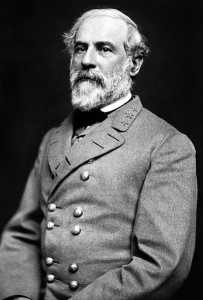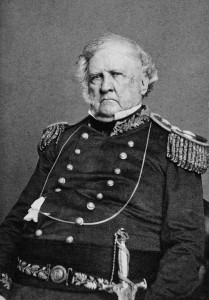
Traveling through Virginia this week, I’m reminded about my own education in Virginia history while growing up in Roanoke in the 1950s and early 60s. It was a different era, of course, and those textbooks have long been replaced. Still, we were given a lasting love for the history of this state by a series of passionate teachers. And prime among the figures taught was Robert E. Lee.
Yet only recently did I learn about one of the most critical episodes in Lee’s life—the meeting between Lee and Winfield Scott in early 1861 in Washington where Scott tried to convince Lee to remain with the Union. Only the two men were present and no record exists of exactly what was said. But that’s where the creative power of drama can take over. Journalist Bill Arthur has written a stage play, bringing this meeting to life.
I interviewed Bill Arthur about his play and aspects of history relevant to this turning point in Civil War. Lee was not the only man to be faced with the difficult choice between North and South and conflicting loyalties. The issues were not as simple as we imagine them to be today. Lee, like many Southerners, was a product of West Point education. He did not favor secession. Many in the North preferred to let the southern states go.
Winfield Scott (“Old Fuss and Feathers”) was the top general in the U.S. Army as the Civil War began, and he considered Lee to be the best soldier in the U.S. Army. He had long been Lee’s mentor.

On April 17, 1861, Scott offered Lee command of the U.S. Army, although Lee only held the rank of colonel. On April 20, however, Lee resigned his commission and three days later assumed command of the Virginia state forces.
While one encounters Robert E. Lee in any study of American history, it is much harder to find Winfield Scott on the same pages. But he figures prominently in the major historical events from the War of 1812 until his resignation from the Army in November 1861. Most notably he commanded the expeditionary force in the Mexican-American War in 1847 and was the Whig party candidate for president in 1852. He was defeated by Franklin Pierce.
So Arthur had plenty of history to draw on in reconstructing this pivotal meeting between Robert E. Lee and Winfield Scott. Listen to him explain how and why he wrote this play.
Podcast: Play in new window | Download



